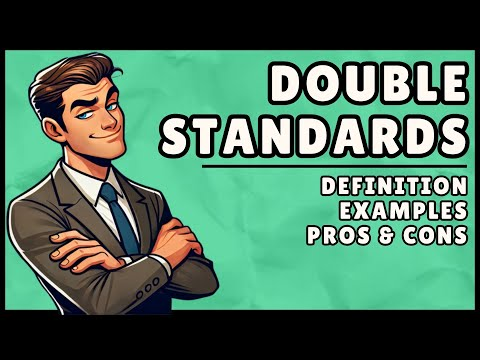
Let’s be honest—we’ve all judged someone unfairly at some point. Maybe you didn’t mean to, maybe you didn’t even notice. That’s the sneaky part about double standards: they often hide behind what we think is “normal.” But when you zoom out, the truth is clear—we don’t always treat people the same, even in identical situations.
Double standards happen when we apply one set of rules to one group and a totally different set to another. And yeah, it shows up everywhere—at home, at work, online, in politics, even in fiction. The worst part? We sometimes enforce these standards ourselves without realizing it.
So, let’s pull back the curtain and take a good look at some everyday double standards we’ve just accepted as normal—and why we seriously need to stop.
Video: Double Standards That Men Face And Women Don’t
Why Dads Get Applause and Moms Get Pressure
Have you ever seen a dad taking care of his kid at the park and thought, “Wow, what a great father”? Now, flip the scenario—a mom does the exact same thing. No fanfare, no applause. Why? Because people expect moms to do it all and more.
Fathers are often praised for showing up, while mothers are judged for how well they do everything. When a dad changes a diaper, he’s a hero. When a mom does it? It’s just another Tuesday. We applaud fathers for being “involved,” but we expect mothers to be flawless caregivers 24/7.
That’s not fair. Parenting is hard work—no matter who’s doing it. Both deserve credit and compassion, not uneven expectations.

When She’s Emotional, It’s “That Time”—When He Cries, It’s Weakness
Let’s talk about emotions for a second. If a woman tears up in a meeting, someone might whisper, “She’s probably hormonal.” But if a man does the same, he’s labeled “too sensitive” or worse—“unmanly.”
We’ve boxed emotions into gender roles. Women get dismissed for being emotional, while men get mocked for showing any emotion at all. It’s a lose-lose for everyone.

Crying is not weakness. It’s release. It’s how humans process intense feelings, regardless of gender. We need to stop treating vulnerability like it’s something to be ashamed of.
Body Hair? Apparently, It Depends on Who You Are
Body hair is another arena where double standards run wild. Men can rock hairy arms, legs, backs—you name it. But the moment a woman skips shaving her legs or underarms, it becomes a topic of debate.

Some people act like female body hair is a crime, while men are praised for being “rugged” or “natural.” Here’s a thought—what if we let people choose how they want to look without attaching shame to it?
Hair is just hair. What’s unacceptable is treating someone like they’re less clean or attractive because they don’t conform to grooming standards created decades ago.
Video: Double Standards
When Men Argue, It’s Assertive—When Women Argue, It’s Aggressive
Picture a man and a woman in a heated debate. The man raises his voice, holds his ground, and people call him confident. The woman does the same? She’s called emotional, difficult, or dramatic.
Same tone. Same energy. Completely different labels.

We praise assertiveness in men but penalize it in women. The message? A woman should be strong—but not too strong. And that mindset doesn’t just hurt women—it limits how men and women interact, communicate, and lead in both personal and professional settings.
Gray Hair: Distinguished for Men, Desperate for Women?
Why is it that when men go gray, they’re called “distinguished,” but when women do, people suggest hair dye immediately?

It’s the same hair. The same aging process. But society says it’s okay for men to age naturally while women should fight it with every serum, color, and cream available.
Gray hair isn’t a flaw—it’s a part of life. And we shouldn’t attach more value to one person’s aging than another’s.
In Fiction, He’s a Hero—She’s a Witch
Let’s talk about storytelling. A man flies? He’s a superhero. A woman flies? Historically, she’s a witch. While modern stories have come a long way, those old biases still show up.
Video: How long will we ignore the double standards in our society towards women?
Female characters are often written with fewer dimensions—either she’s too soft or too fierce, too emotional or too cold. Meanwhile, male characters are celebrated for complexity.
This spills into real life. We judge women more harshly when they step into powerful roles. We still expect them to “tone it down” to be likable, while men get to be bold and ambitious without question.

Dating and Body Standards: It’s Not Equal
Let’s paint two pictures. A curvy woman walks hand in hand with a slim guy. People say, “You go, girl!” Reverse the scene—a slim woman with a bigger guy? Suddenly she’s “gold digging” or “settling.”
These reactions expose our unspoken bias—that men are only valuable if they look a certain way, and women should only date up in appearance or income. It’s outdated and it’s cruel.
People fall in love for all kinds of reasons, none of which require your approval or commentary.

We Forgive Men’s Mistakes but Question Women’s Abilities
When a man messes up, people say, “He had a bad day” or “He’s under pressure.” When a woman makes a similar mistake? Suddenly, it’s, “She’s not cut out for this” or “Women just aren’t good at [insert skill here].”

One slip-up shouldn’t define anyone’s worth. Yet we often hold women to higher standards, especially in leadership, math, science, and finance. It’s like they’re constantly auditioning while men are already cast in the role.
If we want equality, we’ve got to judge performance, not gender.
Here’s the bottom line—we all deserve to be judged by the same standard. Not based on gender. Not based on age, race, or body type. Just based on who we are and how we show up in the world.

Double standards don’t always come from bad intentions. Sometimes they’re just habits we’ve inherited from a society that didn’t know any better. But once we do know better, it’s on us to unlearn, rethink, and reset the bar.
So the next time you catch yourself thinking, “Well, it’s different because he’s a guy,” or “That’s just what women do,” pause and ask yourself—is it really?

Because real progress doesn’t come from calling out others. It starts when we call out the bias within ourselves.


